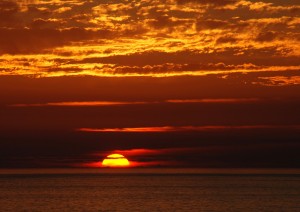blogging earthquake expectations life in Japan living in Japan personal refugee
by sendaiben
leave a comment
Shock Therapy: how a geological event helped cement my minimalist leanings
This post was originally written for an ebook project that never happened. I’m happy to publish it here now.
Are you a wannabe minimalist? I was. It took a major natural disaster to change that.
I became interested in a minimalist lifestyle a couple of years ago. It started with Leo Babauta and Zen Habits, and progressed to Karol, Tynan, Baker, and others. It was appealing, and I spent hours reading articles, following blogs, looking at lists of possessions and checking out minimalist workspaces.
I didn’t actually do anything to change my life, but it was fun thinking about it.
I guess I had the desire but not the drive, the talk but not the walk. I suspect this may be very common, with a small core of people actually living a minimalist lifestyle, and a wider circle of spectators seeing the benefit but not taking action.
This all changed in March 2011. I was just getting ready to teach on an ordinary Friday afternoon when the fourth largest earthquake in recorded history hit the city I live in, doing substantial damage in itself and causing a devastating tsunami. Luckily my seven year-old students hadn’t arrived at the classroom yet, so I didn’t have to worry about them being hurt when everything in the room flew five feet sideways, including computers, tables, and bookshelves.
The earthquake lasted for about five minutes, which is about four and a half minutes too long for comfort. We’re used to earthquakes here, but they normally only last a few seconds. This one started, then got stronger and stronger, and everything just kept violently shaking for what seemed like forever.
After it finally stopped, I left the classroom and checked on some of our neighbors, then stood in a nearby park with other members of the community, all of us shocked into silence.
That evening I sat with my family in our large rental house by candlelight, surrounded by electrical appliances that no longer worked, huddling together for warmth under all our blankets and quilts.
The next day we foraged for food. Going through my daughter’s apartment, taking only food and water and leaving CDs, magazines, clothes, TVs, and furniture behind really made an impression on me. Likewise when we found all the shops closed and shuttered. Gas stations, chained up. Didn’t matter how good your credit was, how much money you had in your wallet.
We’re all just a couple of hours away from that.
That night, back at home taking stock, we received a couple of phone calls from friends and family abroad (I have no idea how they got through as the phone network was down) warning us about the unfolding nuclear accident in Fukushima. We live just under 100km away.
I made a quick decision based on a decision matrix taking into account what would happen under each of four scenarios: there were two variables, whether the accident was serious or not, and whether we left or not. The outcomes were, in turn:
1. the accident was not serious, and we stayed put: nothing happens
2. the accident was not serious, and we ran away: somewhat embarrassing and would cost some money
3. the accident was serious, and we stayed put: irradiation and mass panic when people realised what was happening
4. the accident was serious, and we ran away: safety and some monetary expense
There wasn’t much contest. I persuaded my family, we packed our cars, and we set off a couple of hours later, driving through the night and most of the next day until we got to relative safety in western Japan, several hundred kilometers and a mountain range away from the danger zone.
I locked our house and walked away from everything I owned that didn’t fit into a small bag. We got into the car and left forever as far as we knew.
And you know what? I didn’t care about any of it. For the four weeks we spent with relatives in Kanazawa, on the western coast of Japan, not once did I think of an actual thing we had left behind. Family? We took everyone with us. Friends? Yes. Students? Yes. Our stuff? Not once.
Not one piece of clothing, not one gadget, not one room of the (too) large house we rented.
And that’s when I became a real minimalist.
Just over two years after the event that changed everything, we are living in a small apartment (our rental house was structurally damaged and had to be knocked down), I haven’t bought anything physical for months (sadly, ebooks and music still draw my eye occasionally -I am not yet a digital minimalist), and I am consciously reducing the things I have left.
The next time we have to leave in the middle of the night, I’m hoping to be able to take everything with me.

Leave a Reply